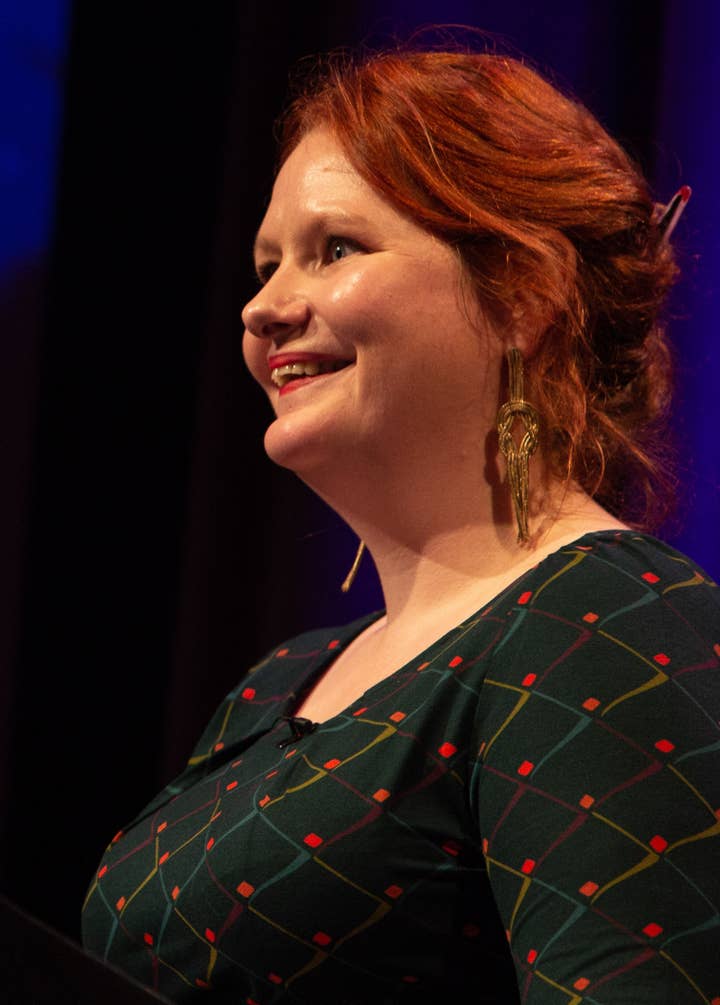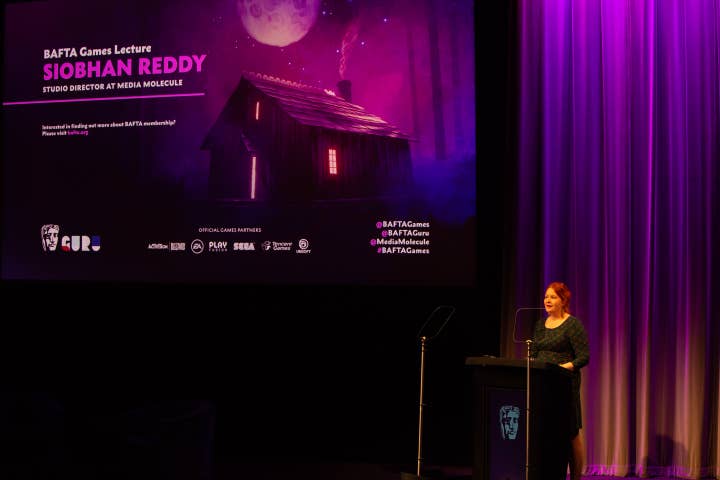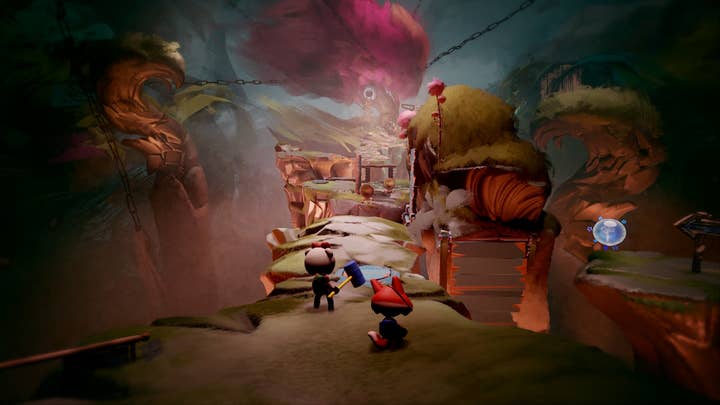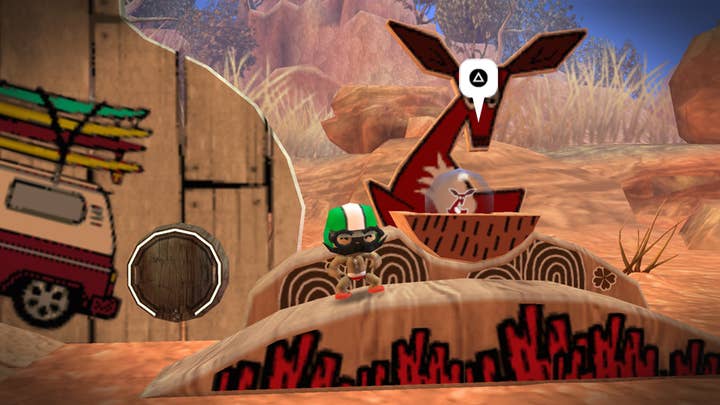"We aren't curing cancer. There's a human cost to making games"
BAFTA lecture by Media Molecule Siobhan Reddy also discussed why making games should be as easy as picking up a guitar
Dozens of industry professionals and aspiring game makers attended this year's BAFTA Games Lecture to hear Media Molecule's Siobhan Reddy discuss "the human cost of making games" and how it can be managed.
Hosted at the Academy's London HQ last night, the studio director touched on the concept of "glitter and doom" - something she has explored in previous speeches - as well as why her team is dedicated to making titles that enable players to create their own games.
"I am pretty sure I was born playing make believe," she began. "Whether it was playing with dolls, Lego, paints or in the pool, I always remember creating my own worlds and adventures. The most wonderful part of being a child is only needing your imagination for play. Whether it was watering the garden and imagining the natural disaster happening below to the imps and faeries, or the world clean-up operation that was vacuuming... I was always a bit lost in my imagination and it's fair to say not an efficient chore do-er."
This has become a key driver in her desire to make games, as has working with countless other creatives in doing so. She cited the "sense of community, joy of playing together and the thrill of seeing people enjoy what we have made" as the most rewarding and fascinating parts of the job.

"There is also no one in the world that will do things exactly like someone else," Reddy said. "Each person is an important piece of that final project. Having the right people on the right project can make a huge difference in so many diverse, intangible ways. If a person is missing, the project changes. If you have the right person in a role, they can go far beyond your expectations."
The studio director added this can be further seen by the thriving community of developers based in Media Molecule's hometown of Guildford, such as Fireproof, Criterion Games, Hello Games, Supermassive and UK offices for publishers like EA and Ubisoft.
"In the 20 years that I have been working in games there has been such a growth in people - make-believers - both amateur and professional because of the accessibility of tools like Unity and Unreal, the ability to learn from generosity of communities with Wikipedia and YouTube, the opportunities for independent developers and wealth of publishing platforms that now exist. The size, and focus of the industry has evolved into something vast and amorphous."
But with this growth comes new challenges.
"Making a good game often isn't enough. There are so many factors to success. But the core of that, for me is people"
"Making a good game often isn't enough," Reddy said. "There are so many factors to success. But the core of that, for me is people. "
She spoke of the lessons learned during her time at Criterion, where she worked on Airblade as well as some of the Burnout titles. Over the course of seven years, she began to truly understand the effect games development can have on its team - both in a positive and negative way - and came away with a revelation.
"We are making entertainment," she emphasised. "We aren't curing cancer. We need to understand the human cost of making games and make the doom manageable."
She added that making games is "an artisanal production, rather than a factory line", and that the "fingerprints" of every developer can be seen in the final products.

The lecture naturally led to her current studio, Media Molecule, which celebrates its 13th anniversary in January. Meanwhile, later this month (October 27th, to be exact), the team's most iconic title turns 10 years old: LittleBigPlanet. For Reddy, this game still encapsulates everything the studio hopes to achieve - as does its next release.
"Media Molecule formed around the idea of making something that let people create together," she said. "The name itself because we weren't entirely convinced that would just be games...maybe movies or music or something else entirely.
"Every one of our games has had community at the heart, and truly, Dreams is the culmination of everything we've worked on to date"
"Every one of our games has had community at the heart, and truly, Dreams is the culmination of everything we've worked on to date."
A key moment in proving this ethos came when LittleBigPlanet was shared at GDC 2007. Suddenly, the risk the team was taking seemed real.
"After all, we were asking people, anyone, to become game developers...and taking a gamble that they would," Reddy said.
"There was a big concern from folks outside the studio about whether or not people would do this. And we weren't quite sure...but we knew this: our own experiences couldn't be unique, we weren't the only ones who enjoyed creating. In fact we were working in an industry filled with people who did. And...the levels that could be built by our team were legitimately built with the tools. It could be done by the community."
Since its launch a decade ago, 11 million levels have been published via the LittleBigPlanet community - and countless more will have been created but not shared. The game has spawn podcasts, community tutorials, millions of videos, fan art and more.
"Our gamble had worked," Reddy said. "This success changed the shape of the studio."
In 2010, Media Molecule was acquired by Sony and this significant step gave Media Molecule the backing it needed to start two projects: Uncovery (which would later become Tearaway) and Dreams, with a dedicated team behind each.

With all its projects, the studio encourages 'jamming', rapid prototyping of new and experimental ideas in order to ensure the final products are creative and original as possible. There's never pressure that every concept needs to make it into the final game, nor are there specific constraints on what Media Molecule wants its developers to try and make. And for Reddy, it's vital that this opportunity is extended to every member of the team.
"When we step outside the normal process of game-making, the schedule, the spreadsheet, the direction... for just a few hours, or a day, we invite our creators to let their personality shine through; to try the thing that makes them excited, to make the thing they wish someone else had made...or just to do something silly, or take a risk.
"Sometimes it's the wildest of ideas that are what's needed. When we self-censor, or tone it down before putting it out there, the beauty of the idea can get lost. Ultimately it's that concept, speed of creation, allowing for happy accidents, that is core to our current project: Dreams.
"We believe that making games should have the same accessibility as using a camera, guitar, or a pencil - something you can start to learn just by picking it up. And just like how everyone who picks up a guitar won't become a rock star, and maybe doesn't aspire to be one: we hope to promote the idea of making games as being a hobby as well, not the commitment of a career."
Dreams, Reddy said, is the evolution of LittleBigPlanet combined with all the storytelling techniques learned from Tearaway. But whereas the LBP games only allowed users to create things within the game's set aesthetics, Dreams offers more freedom in creating your own look, feel and sound.

She described Dreams as a "game creation engine that brings all the disciplines into one space so moving between them is a fluid experience". Players will learn how to use these tools as they go, not only creating characters and environments, but also music and VFX.
"You're never waiting for something to render, everything plays on screen in real time so you learn as you go and play your creations as you make them," she said. "And like LBP we are making a game with those tools, that's our way of testing them and keeping them grounded."
"Making games should have the same accessibility as using a camera, guitar, or a pencil - something you can start to learn just by picking it up"
She showed a few videos of Media Molecule's creations in Dreams, from platforming and space battle games to a music concert demonstrated at E3 earlier this year.
"This project lives up to the story behind the name Media Molecule. It's not a traditional game," she said. "It's games, movies, songs, characters, a playlist maker, an art gallery [and more]."
Getting back to the human cost of development, Reddy admits she would be "lying if I told you now that things were plain sailing". One challenge the studio faced was when the Tearaway team was combined with those already working on Dreams after the PS4 Tearaway Unfolded was released. While the Tearaway games had reviewed well, their commercial underperformance impacted the vibe at the studio. But as time progressed, it became clear that the recombined team brought work on Dreams to full strength.
Reddy then reflected on the influence of her childhood. Her parents ran a suburban shoe shop in Sydney, and it was here the veteran developer learned about the importance of company culture.
"There was a very clear set of rules, and expected behaviours: We had to be on time, eat only in our lunch break, never eat at the counter, write neat receipts, always treat people respectfully, take the time with each person to have a conversation, and never make anyone feel unwelcome. We would have punk rockers, sat next to kindergarten kids, next to retirees. It was a real mix."
Her father was also open to her ideas on how to engage with the community that grew around the shop. While Reddy has read many book on growing a business and its culture, "no-one gets it quite as right as my good old mum and dad."
"As a company we share a goal of making a game for people, but as a director my main goal is now ensuring that this is a good place to work"
She continues: "I think about this all the time at Media Molecule. As a company we share a goal of making a game for people, but as a director my main goal is now ensuring that this is a good place to work. Are our people are okay and is our structure working? Does everyone have a voice? Is our studio adapting to and addressing the pressures of development? Who are we as a company?
"I have an ambition for how I want our culture to feel, but we are all humans living our own epics and co-existing in this space for a few days a week. Our studio changes with our projects and with our people. That idea - we are creating entertainment, not curing cancer - is very important to remember.
"We can improve people's lives, by continuing to adapt and change our companies to the needs of the people who work in them or may one day work in them, just like we adapt and change our games to suit the needs of our player communities."

She touched on the lessons studios can learn from community management, suggesting that the relationship between your company and its customers is no different to that between the director and the staff. You need to keep them constantly engaged, "even during the slow times", and giving the team opportunities to engage with each other - not just in the pub after work, but at company-wide lunches, for example - helps them form their own bonds.
Transparency, she said, is also key: "You have to let people know what is happening. It affects them. But you don't want to demoralize or scare them or give them information they can't put into context. There is such a thing as being too transparent, and it's a difficult but important line to walk, especially when you are in a leadership role.
"It is up to us to exemplify what we want to see in our communities and companies. Not just in our own behaviour, but what we put on a screen"
"Good community managers also model behaviour by example by setting a code of conduct and being the representation of that. It is up to us to exemplify what we want to see in our communities and companies. Not just in our own behaviour, but what we put on a screen."
Crucially, it's important to remember that everyone - including the directors - are human. Sometimes, Reddy admits, she fights with one of her co-directors, ignores an issue for too long, or makes mistakes. Sometimes she can worry about the smallest error for weeks, and has to remind herself it's impossible to get everything right all the time.
"That may sound like a cop out, but it's actually a good reminder that I also have to ask for help when I need it, I should talk to people when I am overwhelmed and sometimes it is better for me to work from home," she said.
"Because then it reminds me that everyone is feeling variations of this, and I should set an example rather than cling to the old idea of carrying everything without complaint and perhaps failing, silently. We model the behaviours we want to see, and I want a team that isn't afraid to ask for help, talk about an issue, or let me know when they are overwhelmed."
She continued: "It might be cliché to say that we have to be the change we want to see, but even I had to go through a journey to understand, for example, my role as a woman within the industry. After LittleBigPlanet, I was added onto a list of powerful women in the UK and that opened the floodgates to a lot of recognition. And recognition, if I am honest, that I wasn't very comfortable with. Until that point, I didn't really do much other than my job. I am eloquently quoted as saying this award put a rocket up my bum. Thanks, me."
"People shouldn't feel that this industry isn't a place designed for them, nor should they see it as a space that would be hard for them to exist in based on any factor of their identity"
Since then, she has been asked to join various boards, ranging from the GDC advisory board to the BAFTA Games board, and these experiences - looking at the wider issues not only in our own industry, but others as well - have helped give her perspective on the impact even a studio the size of Media Molecule can have on the world.
"Our inventions have become a multi-billion dollar industry, and are firmly entrenched in popular culture," she said. "People shouldn't feel that this industry isn't a place designed for them, nor should they see it as a space that would be hard for them to exist in based on any factor of their identity."
She emphasised the importance of diversity - not just in gender or race, but in backgrounds and life experiences, which is "naturally going to result in art that is more considerate, more varied, more interesting, and more powerful."
The Media Molecule team is now 38 per cent female, but this has required a conscious effort and greater outreach, from being more experimental with recruitment to welcoming more interns and even school groups.
Reddy concluded by expressing her love for the job, for the team and the fact she helps to "create make believe for everyone", building worlds, characters and experiences that "literally couldn't ever exist" - and that we should be doing all we can to welcome more people in growing this.
"We are an ideas and imagination industry, and it's an industry that is growing and one that has amazing opportunities and big challenges ahead," she said. "We can only do that if we remember that people are at the heart of this.
"I truly hope this industry can be as good to the people who make games as it is to the people who play them. Sometimes it's the person who isn't there that affects a project, and we, all of us, need to ensure that they are."
